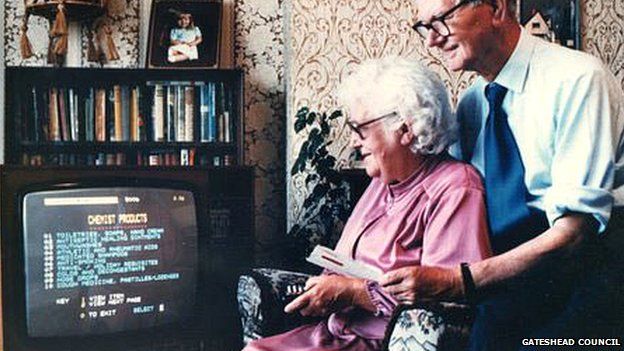Online shopping: The pensioner who pioneered a home shopping revolution
- Published

People spend billions each year shopping online, but few know it was a grandmother from Gateshead who pioneered it from her living room.
It was an order for margarine, cornflakes and eggs that paved the way for an industry now estimated to be worth £117.6bn ($186.1bn) to the UK economy alone.
Grandmother Jane Snowball, 72, sat down in an armchair in her Gateshead home in May 1984, picked up a television remote control and used it to order the groceries from her local supermarket.
She was part of a council initiative to help the elderly. What she - and everyone else with her at the time - didn't realise was that her simple shopping list was arguably the world's first home online shop.
With her remote control she used a piece of computer technology called Videotex. It sent the order down her phone line to the local Tesco - the goods were then packaged and delivered to her door. Mrs Snowball never saw a computer - her television linked her to the shop.
"What we effectively did was to take a domestic TV in a home and turn it into a computer terminal," says Michael Aldrich, the man behind the technology for the system. "That was the big leap."
It was years before the world wide web came into being.
"Aldrich and his company were very, very advanced for the time," says Kevin Turner, principal lecturer at Brighton Business School, where the Michael Aldrich Archive is kept. "It demonstrated that people could do transactions from home."
Aldrich's system incorporated a television with a chip set used at the time by BT's teletext service Prestel. It was an information service like the BBC's Ceefax and ITV's Oracle.
Using a domestic phone line he connected the TV to retailer computers which could process the transactions. He had built a real-time, multi-user transaction processing computer.
Michael Aldrich with one of the online shopping gadgets
Videotex was already being used by companies to do business, most notably the travel industry. But it was a Gateshead Council community initiative that saw it become the world's first business-to-consumer home online shopping system.
The Gateshead Shopping Experiment was about helping pensioners with mobility problems. Aldrich was keen to provide the technology as he had been thinking about home online shopping for a few years. Three retailers, Tesco, Greggs and Lloyds Pharmacy, agreed to get involved.
Mrs Snowball was selected to try the system as she had broken her hip. She was given a standard television with the chip set and a remote control with an additional button on it that said "phone".
Pressing the button brought up a directory of retailers on the TV screen in the format of a standard teletext page. She would choose a retailer and then the goods. With no world wide web, phone numbers had to be used.
There was a list of 1,000 items from Tesco alone. The order was sent down her phone line, packed and delivered by the supermarket. Mrs Snowball paid in cash when she got her shopping as credit cards were not widely used at the time. It took just 15 minutes to teach her how to use the system.
"It was 1984 and you were doing online home shopping, it was amazing and she loved it," says Aldrich.
"It worked very well... and she could just turn off the computer and go back to watching Coronation Street."
Mrs Snowball declared it "wonderful", although Aldrich remembers that she missed the social interaction of shopping.
"Shopping was a social activity where she met friends," he says. "But the system worked very well for ages."
It was adopted by Bradford Council a few years later but never became widely used. The system worked well for businesses-to-business transactions but home online shopping was not viable until home PCs started to become widespread and the internet more popular.
"It's significant because of its influence rather than its direct impact," says Asher Rospigliosi, senior lecturer in e-business and management information systems at the Brighton Business School. "If you only have a few customers it's extra labour for not much extra profit."
Aldrich went on to become an information technology adviser to Margaret Thatcher. Tesco became one of the first retailers in the UK to offer a home online shopping service. Mrs Snowball was recognised by Gateshead Council for the part she played in the ground-breaking initiative in a ceremony in 2009.
But no-one at the time knew the experiment would actually anticipate a transformation of shopping. Gateshead Council says it has has very few records of the experiment because it didn't realise how significant it was at the time. It would be another 10 years before retailers would see the potential.
"It really was a momentous landmark," says Rospigliosi.
But ultimately it was fun, says Aldrich.
"If I hadn't invented it someone else would have done," says Aldrich. "All I've ever thought was it was exciting and interesting but above all fun."
Robert Peston Goes Shopping is on BBC Two at 21:00 BST on Monday 16 September or catch up with iPlayer.